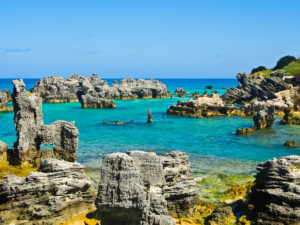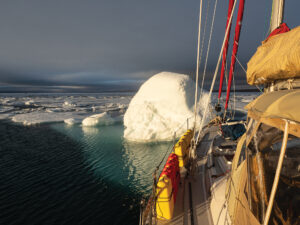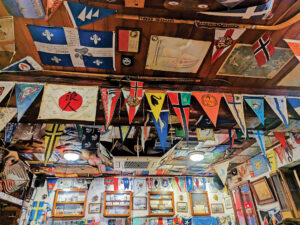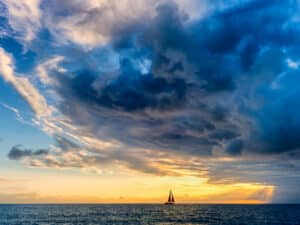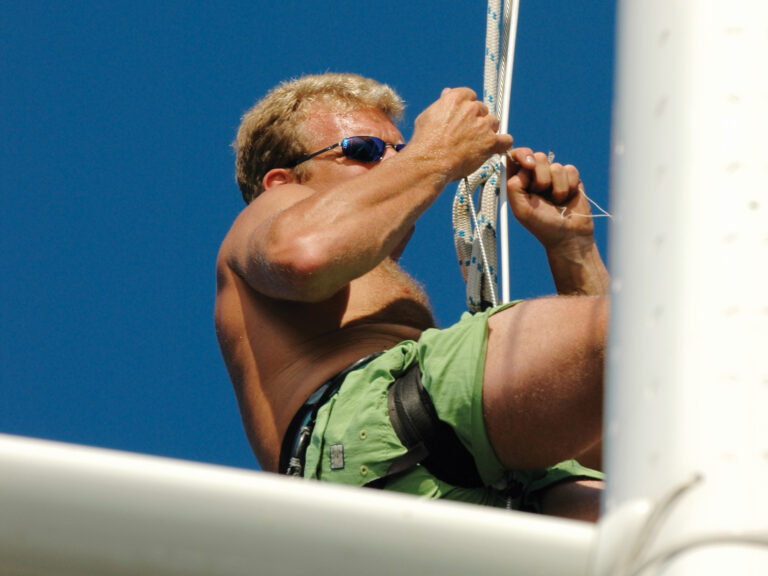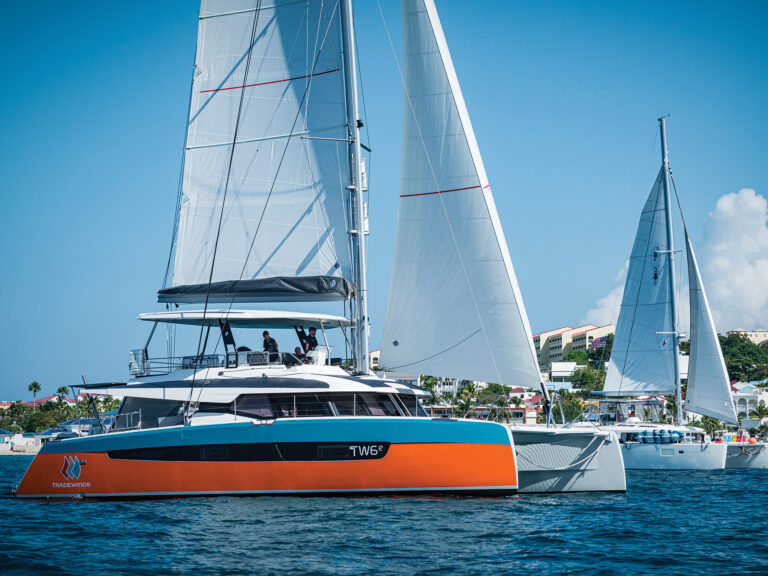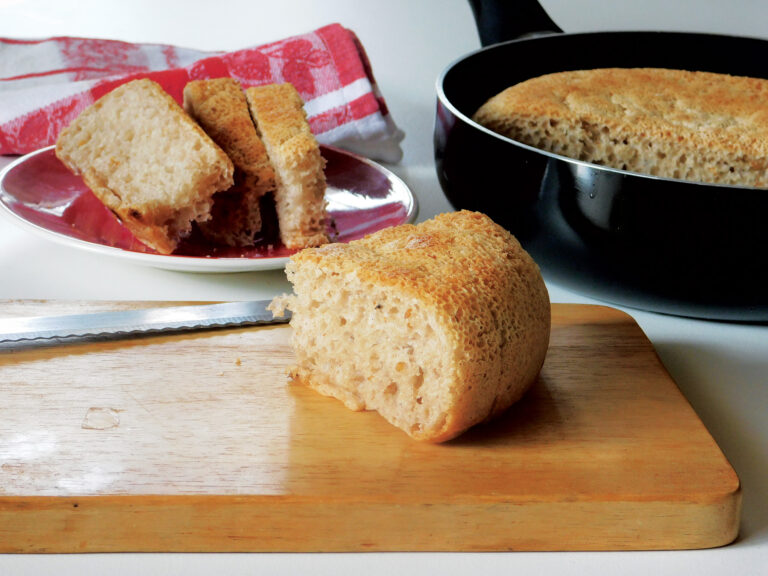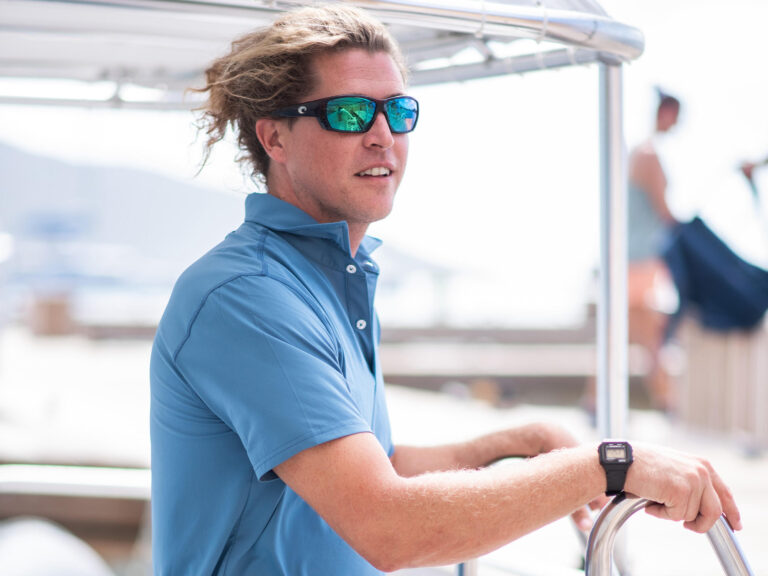There are an infinite number of either/or ways in which to cleave the universe, but when it comes to cruising, perhaps no demarcation is so distinct as the differences between being tied to a dock and floating at anchor. The demands and joys of those lives are light-years apart. In the week before we slipped our lines, Bernadette did major provisioning, and on our second last day in Cartagena she went to the towns mammoth outdoor market, which is made up by thousands of food stalls. Like everyone else doing a serious shop, she hired an urchin to carry and guard her purchases of yet-to-ripen vegetables and fruit. She bought only food that had never been refrigerated, because its likely to last longer on board. Bernadette filled not only the fridge, but also a few baskets in the quarter berth which we call our pantryand two mesh hammocks that stretch across our main cabin. They hang low now, swollen full with avocados, bananas, limes, oranges, grapefruits, apples, garlic, mangos, carrots, and onions. Sadly, we know our precious lettuces and bunches of spinach, cilantro, basil, and parsley will last only so long in their long-life bags in the fridge, and then well return to the mighty cabbage, the green that refuses to die.
|
| | Before we left Cartagena’s shops, Ithaka‘s larder was stocked, and her fridge and hanging hammocks laden with cheeses, fresh fruits, and vegetables. Our last act was to pick basil at Club de Pesca—locals use it all the time to settle the stomach, so it’s everywhere.* * *|
Four days before leaving we took down the awnings and scrubbed them ferociously. I hauled our helper, Alfonso, aloft. Armed with a water hose, bucket, brushes and soap, he sluiced and polished the rigging, halyards and mast, all of which were black with Cartagenas grit. Bernadette and I replaced a halyard whose sheath had bitten the dust, and then we slid our spanking-clean genoa back up its foil, wound on a new roller-reefing line, and tested as much gear as we could. But with 24 hours to go, we had to bow before the obvious: wed never cross all the tasks from our list before the next weather window closed. Instead we merely announced “Were done”the same strategy advocated by the late Senator Aiken for getting out of Vietnam: Just declare it a victory, and leave.
In our pell-mell frenzy, we wondered what all wed done wrong, when our errors would catch up with us, what would break first, and what fresh hell would ensue. But on the last day at a dock, its probably better to call it quits, feast with friends and say the goodbyes, some to people you may not see again. Bernadettes goodbyes also included lots of hugs and playing with Chula, the marinas mascot puppy, named for one of the cruising boats at the dock. Theyd become friends, and Bernadette gave one of our favorite night guards, the one Chula was always following around, a big bag of dog food and rawhide chewies, with specific requests about doling them out.
| | Douglas changes the oil and replaces a hose on the engine.* * *| Most cruisers whove stayed put awhile admit they get plenty nervous before giving up the security of wherever they are, regardless of how far theyre going the next day. Fissures start crackling that thin crust of bravado which camouflages everyones fears. I was reminded of the comment by the main character in Yann Martels _The Life of Pi_, a story about a ship that sinks and a boy and tiger who survive many months in a lifeboat. Pi says, “I must say a word about fear. It is lifes only true opponent. It has no decency, respects no law or convention, shows no mercy. It goes for your weakest spot, which it finds with unerring ease.”
Our very last act before leaving was to unplug ourselves from the dockside power box and freshwater spigot. To quit suckling at those bountiful breasts meant that we returned to a life of choicesabout lights, stereos, computers, CD burners, showers, and dish washing. Instantly, its a different consciousness when unlimited resources turn finite.
| | We galvanized our CQR anchor and re-marked the anchor chain.* * *| We decided to leave at 6 a.m. because the winds in Cartagena are lighter in the morning, and we figured it would be easier to back out of our berth, and slip our lines from the pilings behind us, if there were less breeze. We each had visions of _Ithaka_ as a pinball among those pilings. However, we demonstrated reasonable dexterity, and even the piling lines bowlines, encrusted with pelican guano, untied like theyre supposed to.
When we first arrived in Cartagena, it looked and felt like a forbidden land. But now, as we leave, the skyline that so daunted us blends seamlessly into the warmly familiar. About a mile from Club de Pesca, where weve been docked, smack dab in the middle of the bay stands Cartagenas statue of the Virgin of El Carmen, the patron saint of sailors. We were delighted to see her when we first arrived, and I waved to her on the way out. And why not? In Cartagena, theres no reason to offend a saint. This was, after all, the seat of the Holy Office of the Inquisition in the New World, with jurisdiction over the entire Caribbean, Venezuela, Panama, the Antilles and Cuba. Established in 1610, and lasting 200 years, a series of righteous souls kept an exquisite vigil over “the purity of the Doctrine of the Catholic Church.” According to Colombian historian Eduardo Lemaitre, the Inquisitors of Cartagena carried out sentences “ranging from fines and the wearing of the sambenito (a garment of shame) to rowing in galleys, life imprisonment… and the death penalty.” The most common crimes were “dogmatic heresy, blasphemy, bigamy, and witchcraft.” In a tribute to investigative methodology, the local Museum of the Inquisition still has one of the original rackstruth serum at its most effective.
| | On our final few days, Bernadette handled all our last-minute running around and shopping, while I worked on the boat.* * *| I think about these things when sailing by saints, but I also figure Im relatively safe because long before _Ithaka_, an awful lot of sinners have passed without a hitch through the Boca Chica channel thats the main thoroughfare in and out of Cartagenas harbor. By the end of the 16th century, this was the most important port in the Americas. All that gold the conquistadors stole from everyone in sight was shipped from here to Spain.
Ithaka sailed without contraband, but we carried a treasure of memories. Among them is a richer appreciation for author Gabriel Garcia Marquez, whose literature of magical realism seems appropriate for us, blithely camped in a nation that’s fighting a decades old civil war. Few Colombianos feel safe traveling anywhere in the beautiful countryside or even on the major highways between cities. Comfy Cartagena is an oasis in the Colombian nightmare, a unique sanctuary where it’s easy to pretend all’s well. But in fact, paramilitary guerrilla groups—FARC (Revolutionary Armed Forces of Colombia), MAS (Death to Kidnappers), ACCU (Peasant Self Defense Units of Cordoba and Uraba), ELN (National Liberation Army), EPL (People’s Liberation Army), and AUC (United Self Defense Units of Colombia)—terrorize the nation. Despite names that suggest otherwise, they’re mostly fueled by drug money.
Without wind, we motored down the eight-mile channel, past the anchorage, the submarines, the refineries, the tankers, through the gate where Drake traveled before us, and out to sea. There was a serious swell, and both of us felt a little green, but by 10 oclock the breeze freshened, we unfurled the genny, turned off the diesel, quit rolling so much, and immediately felt lighter. The moment the water turned blue, I baited a pair of lures, paid out two trolling lines, and was back in the game.
|
| | Photos courtesy of Roy Mallen on s/v Lisa| | The payoff of getting out of the city, and back on the hook amid tropical islands—we are again surrounded by the beauties of nature. * * *|
Its only about 30 miles to Colombias tiny Rosario islands, where there are numerous reefs for diving and several anchorages well protected from the seasonal winds, which build all day and level off in the late afternoon to between 20 and 30 knots. Consistently out of the east-northeast, they scream through the night until just before dawn, when instead of abating gradually, its as if someone throws a master switch. The wind suddenly dies to 3 or 4 knots and stays that way for hours, exhausted and tumescent, gathering strength before rising again after noon.
We chose the Rosarios as a transition spot where we could finish stowing whats still rattling about, and resettle ourselves and the boat. Wed planned on heading a little farther south, to a bay off the mainland near the more remote San Bernardo islands, but locals told us theres been guerrilla activity there lately and we should give it a pass. Thats fine. The Rosarios are close enough in time and distance, and calm enough in character, to relaunch us after being umbilically connected to land.
| | As Ithaka left the Boca Chica cut, past the sea buoy, and into the open ocean toward the Rosario islands, dolphins played in our bow wave.* * *| As we approached our anchorage and tried to furl in the genoa, it was clear we’d wrapped the drum too loosely, and it fouled. There was no way that puppy would roll in, so at the last minute we turned back to the safety of the open sea, headed into the wind, and in 25 knots, fought the sail down its track, and lashed it on deck to await redress. Every trip needs a screw-up to mark its official beginning: We got off light. We stayed in our first anchorage only that night. We’d dropped in 20 feet, onto a hard bottom, but after my diving it, and working it a bit, we’d hooked into a crevasse, and let out plenty of scope. Not ideal, but inertia’s a powerful force, and at the moment it felt good enough. When winds became wicked that night, we stretched back disconcertingly over an abyss 65 feet deep, and regretted our decision. From 7 p.m. on, winds gusted to 38 knots, and we alternated two-hour anchor watches. First thing the next morning, we were out of there to another anchorage a few miles down the Rosario chain, and after shimmying between an opening in the reef, we planted ourselves instead in 20 feet of good sand, fully protected from wind and chop by a circle of coast and reef line. Here we could relax.
| | In Cartagena, every night we watched the spectacular skyline of antique buildings light up as darkness fell. Back out on the hook, nature does it all even better.* * *|
Over the past several days, weve stowed deeply the electrical cord and the water hose, and arranged everything several times as we reorder our little world. Days here are lazier than in Cartagena, although taking care of the boat remains the central focus. Weve cleaned the bottom and reinserted the paddle-wheel speedo now that were in clean water. Weve scraped barnacles off the shaft and propeller, remarked the anchor chains, repainted the outboard prop, started showering again with saltwater before a fresh rinse, and turning off lights. Weve returned to the delights of the heavens: shooting stars, sunsets, moonrises. Outside the marina now, radio reception is less impeded and were tuned each morning to the SSB 8107 Panama Connection Net, catching up with old friends in distant places. Ive started studying my ham license books.
| | Silk painting by Annika Oury on s/v Street Legal| | When I catch our first fish, after too long away from the game, I’ll know we’re back. * * *| Most importantly everyday we’re back in the water, taking long strokes through the turquoise. I’ll really feel right with the world when I’ve shot my first fish, but until then we’ll buy our daily fare from the fellows who paddle up in their wooden _cayucos_. The negotiations are predictable and sometimes confusing. We wonder: Are two kilos of snapper worth three dollars or four? We wonder, too, if we’re being charged a gringo tax, knowing the guys will get less in their village. Should they charge more since they can? Should we pay more? Should we hold the line for the next fellow? We all know there’s a game of wits afoot, and in the end today we agree to a fair-enough common ground—roughly in the middle of our opening bids. There’s a no-nonsense gravity until the deal is struck, and then grins all around. The chief _pescador_ announces, “Contento, señor”—I’m satisfied. “Tambien,” I say—me too. We shake hands. Today’s match is concluded, but it will resume mañana.
| | Photo courtesy of NASA| | So much of cruising reminds us that everything is a matter of perspective. * * *| In this negotiation I was distracted, though. Bernadette had just taken a loaf of banana bread out of the oven, and the aroma, which Ive not known for a while, was stealing my concentration. I went below and cut off a slice, returned on deck and watched our fishmongers leisurely paddling back to their village on Isla Grande. Its a dusty pueblo of tin-and-thatch-roofed shacks, naked kids. Hooked to car batteries is a thunderous stereo system whose pounding base will drive us away if it continues tomorrow.
Were back out, though, and it feels good. Well miss the restaurants, the Internet, and lifes many conveniences. Were in for shoals and reefs, close calls, broken gear, some nights without sleep, and fuller responsibility for our lives. How is it one can so love the luxuries and the deprivation too? Sanity is sometimes defined as being able to cling comfortably to two opposing notions simultaneously. Umm, its a pleasure to be back on the hook.
e-mail the Bernons: Ithaka@CruisingWorld.com
| Log Of Ithaka EndingLife is a series of transitions, and so it is, too, with the Log of Ithaka. Theres no perfect time to bring this sort of series to a close, but in two weeks, on February 28th, well be posting our final column. Well continue to write the monthly back-page essay for Cruising World magazine, but we hope to spend more hours experiencing our voyage while were still lucky enough to be out here, and fewer hours before the computer chronicling it. For now, many thanks to all. |

